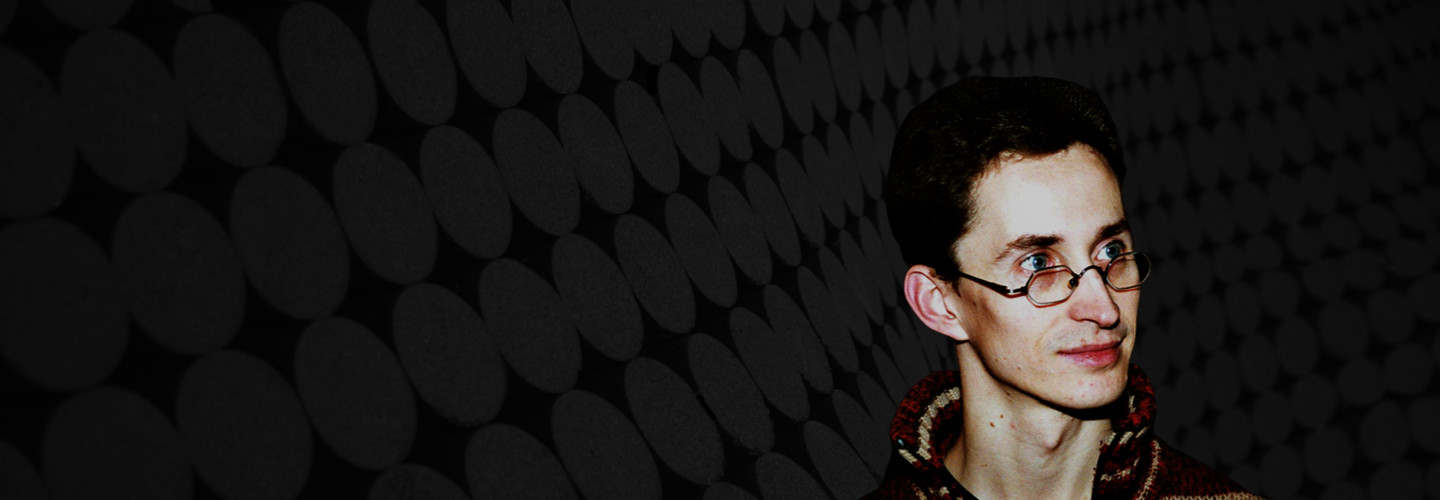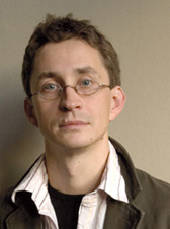

Vykintas Baltakas
*10 July 1972
Works by Vykintas Baltakas
Biography
1972 – born on 10 July in Vilnius/Lithuania
1990–1993 – Vilnius Music Academy (composition studies with Vytautas Barkauskas, conducting with Lionginas Abarius);
Founder and conductor of the vocal ensemble “Penki vejai”, as well as the chamber choir “Aidija” in Vilnius
1990 – Second Prize at the Youth Conductors’ Competition in Kaunas
1991 – Third Prize at the Composers’ Competition “Jauna Muzika” in Vilnius
1993 – Prize at the conductors’ course “Extreme” in Mürzzuschlag (Austria)
1993–1997 – University of Music Karlsruhe (composition studies with Wolfgang Rihm, conducting with Andreas Weiss)
1994 – Centre Acanthes in Avignon
1994–1995 – International Bartók Seminar in Szombathely
1994–1996 – Darmstadt Summer Courses;
works in the ComputerStudio at the HfM Karlsruhe (Institute for new Music and Media)
1996 – Kondrashin Masterclass;
Scholarship from the Heinrich Strobel Foundation for Composition in Freiburg;
Awarded a prize for Pasaka for piano solo at the Darmstadt Summer Courses
1994–1997 – Internationales Peter Eötvös Institute
since 1995 – Assistant to Peter Eötvös at the Karlsruhe Music Academy
1995–1997 – Music Director and Conductor of L’Ensemble du Nouveau Siècle Strasbourg
1997–1998 – Music Director at Schloss Rheinsberg (guest performances at the Mecklenburg Vorpommern Festival, the Leipzig Opera, Schleswig Holstein Music Festival)
1998 – Conservatoire National Supérieur, Paris;
Scholarship at the manor house Edenkoben;
Music Director of a project entitled “Voix[time] with Ensemble Modern and the vocal ensemble Belcanto Frankfurt at the Darmstadt Summer Courses;
Concerts at the Bonn Opera (“Bonn Chance”), Musica Festival Strasbourg and Wien Modern;
Concerts with the Lithuanian Chamber Orchestra at the Vilnius Philharmonic Hall
1999 – Performances at Landmarks99 in Duisburg
1999–2000 – Course at IRCAM in Paris
2000 – Performances at ZKM Karlsruhe, Stedelijke Museum Amsterdam, Cité de la Musique in Paris and Ars Musica in Brussels
2001 – Portrait concert at Gasteig Munich (Klangspuren), première of anderes Lied;
double at the Munich Biennale on 28 March
2002 – 13 September: World première of Poussla (first edition) for ensemble and orchestra, commissioned by WDR Köln (WDR SO Köln, c. Sylvain Cambreling)
Composition Award for Pasaka, Concours International de Piano XXème siècle d’Orléans
2003 – International Composition Award Claudio Abbado;
15 June: World première of about to drink dense clouds for voice, chamber ensemble and tape (Klangforum Wien, c. Vykintas Baltakas), commissioned by Vienna Festival and Klangforum Wien;
concerts: Queen Elizabeth Hall / London, MaerzMusik / Berliner Festspiele, Festival Musica/ Strassburg, Centre Pompidou / Paris
2004 – 18 May: World première of the music theatre Cantio (c. Christoph Poppen, Münchener Kammerorchester, Regie: Osvaldas Korsunovas), commissioned by Münchener Biennale;
11 September: World première of Ouroboros for ensemble, commissioned by Klangspuren Schwaz (Gaida Ensemble, c. Vykintas Baltakas)
2005 – 24 February: World première of (co)ro(na) for ensemble in Hamburg
(NDR SO, c. Vykintas Baltakas);
24 April: World première of Ouroboros - Zyklus I for soprano, ensemble and tape, commissioned by Wittener Tage für neue Kammermusik (Klangforum Wien, c. Johannes Kalitzke)
2006 – 25 March: World première of Poussla (second edition) for ensemble and orchestra, commissioned by Berliner Festspiele - MaerzMusik (SWR-SO Baden-Baden und Freiburg, c. Sylvain Cambreling)
2007 – 21 April: World première of the string quartet b(ell tree), commissioned by Wittener Tage für neue Kammermusik (Arditti String Quartet);
3 May: Ernst von Siemens Grants-in-Aid in Munich
2008 – Lecturer for composition at the Darmstadt International Summer Course for New Music
14 February: World première of Instruktionen zur Durchführung einer alten Liebesbeschwörung, die Ihre/Ihren Geliebte(n) auf einmal und für immer an Sie binden wird
2009 – 27 Mai: World première of the ensemble work Lift to Dubai for Ensemble Modern
2009 – founded the Lithuanian Ensemble Network
2010 – 29 May: World première of Eine Josquin-Promenade for live electronics and choir;
24. September: World première of Scoria for orchestra, RSO Munich, c. Lucas Vis, Herkulessaal Munich;
25. October: World première of Redditio for ensemble, c. Vykintas Baltakas; Leuven, Belgium, at the Transit Festival
2011 – 2 June: World première of Commentum for violoncello and piano
2013 – 28 April: World première of Saxordionphonics for saxophone, accordion and chamber orchestra
2013 – 24 August: Eselsbrücke for ensemble is premièred at the Salzburg Festival
2014 – 10 January: World première of Redditio 2 in London
Co-operation with the following orchestras:
Radio Symphony Orchestra Munich, Deutsches Symphonie-OrchesterBerlin, Rundfunk-Sinfonieorchester Berlin, SWR Symphony Orchestra Baden-Badenand Freiburg, WDR Symphony Orchestra Cologne, Munich Chamber Orchestra, LithuanianState Symphony Orchestra, Lithuanian Chamber Orchestra, etc.
... and ensembles:
Ensemble Modern, Klangforum Wien, London Sinfonietta, MusikFabrik,Scharoun Ensemble Berlin, ICTUS, Arditti Quartet, Neue Vocalsolisten Stuttgart,Ensemble Resonanz Hamburg, Gaida Ensemble Vilnius, Lithuanian EnsembleNetwork, Remix Ensemble, Champ d’Action, Het Collectief, etc.
Radio recordings: Deutschlandfunk (Berlin), WDR (Cologne), SWR (Stuttgart), Hessischer Rundfunk (Frankfurt), Lithuanian State Radio (Vilnius)
About the music
Vykintas Baltakas is a composer, conductor, programmer and curator, also in the field of electronic music.
He actively participates in the programming of new music both in his capacity as a conductor and in cooperation with his ensemble the Lithuanian Ensemble Network.
Baltakas was born on 10 July 1972 in Vilnius/Lithuania. The date and place of his birth have played a decisive role in his life: he was born late enough to profit as a young man from the freedom and openness of his native country. If you look at his biography, you will be struck by his restless mobility. Mobile as far as his ceaseless activities are concerned even before leaving Vilnius to continue his studies in the West and mobile also in the sense that he has never stayed for long in whichever city he found a place to live. His restlessness stemmed no doubt from the desire to learn as much as possible, to absorb new impressions, to develop further and to try his hand at various activities (from artistic director to assistant, for instance of his erstwhile teacher of conducting, Péter Eötvös).
As a composer and also as a conductor, he has appeared all over Europe. Here is a list of the major venues: apart from Vilnius, Karlsruhe where he studied composition with Wolfgang Rihm and conducting with Andreas Weiss; Darmstadt where he has been a regular visitor of the Summer Courses, Paris, where he studied at the Conservatoire National Supérieur and worked at IRCAM, Munich where his chamber opera was premiered and of course the Belgian town of Wilsele, where he lives with his family.
Folk music in Eastern Europe continues to be part of the population’s cultural consciousness. Pusline (1997/2000) for ensemble or Poussla (2002/2006) for ensemble and orchestra were inspired by a “Lithuanian instrument with an animal bladder for resonant body which makes a sharp sound” – as Baltakas puts it. He must have had the sonority of that folk instrument in his head when he set about composing those pieces but the music itself does not really betray where the composer comes from. Much rather, it says a great deal about the way he thinks about music and about his originality which impresses not only his listeners but also readers of his programme notes.
He writes about Poussla: “A field of energy which is present at every moment, ceaselessly revolving and offering new aural perspectives. A huge wheel.” On Pasaka/a Tale (1995/1997): “You tell a tale. For yourself, for somebody else … It’s immaterial. What counts is the wish to tell it. That you must! It is a tale!! … or … it is also a tale…”
Texts like that say a great deal about the composer: he wants his music to communicate, he wants to communicate with his listener, he wants to tell him something. This is an essential stance of an artist, in whatever field he may be active.
Years later he composed another work testifying to his inner need to communicate with his music. He wrote a programme note on his about to drink dense clouds (2003) for reciter, chamber ensemble and tape, which reads like a fairy tale. Once upon a time…
“There was a poem, an idea, a crumbling thought,
a crumbling thought from ancient times
crumbled so much that it is hardly an idea any more.
A fragment of an idea
A fragment by Simonides.”
After a quotation, he continues:
“And there is still an idea behind it! Perhaps even a poem.
Which was once there but now has to be found again.
That is what I am looking for. With my fantasy as my tool.
So that it speaks again.”
Yes, music but speak. One wishes the young man from a Lithuanian tale much luck and success in the great wide world, so that he can make instruments talk, using his imagination as a tool …
